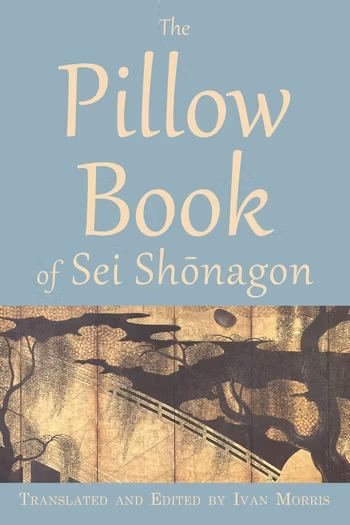"The Pillow Book" is renowned for its distinctive style, characterized by its witty and insightful commentary, elegant prose, and sharp observations. Shonagon's writing delves into various themes that were prevalent in Heian court life:
Courtly Life: Shonagon meticulously describes the rituals, ceremonies, and customs integral to courtly existence. Her keen eye for detail vividly brings to life the opulence and minutiae of the imperial court.
Emotions and Relationships: Within the book, Shonagon explores the complexities of human emotions, love, and the transient nature of relationships. She candidly shares her thoughts on romantic entanglements and social dynamics among the courtiers.
Nature and Seasons: Like many Heian-era writers, Shonagon draws inspiration from the natural world. She frequently references the changing seasons, cherry blossoms' beauty, and moonlit nights' serenity.
Humor and Satire: Shonagon's writing is imbued with humor and satire. She humorously critiques various aspects of court life, including the behavior of her fellow courtiers, revealing a sharp wit that remains entertaining to this day.
Notable Passages:
While summarizing the entirety of "The Pillow Book" in a concise manner is challenging due to its diverse and episodic nature, here are a few notable passages:
"In Spring it is the dawn that is most beautiful..." - Shonagon's poetic description of the beauty of dawn and the changing seasons.
"It is a most wonderful comfort to sit alone beneath a lamp..." - Shonagon reflects on the solace of reading and connecting with the thoughts of authors from different eras, a sentiment that resonates with avid readers.
"Things That Should Be Large" and "Things That Should Be Small" - Shonagon's lists of items that should be either large or small showcase her penchant for categorization and her keen sense of aesthetics.
"Lament Over the Difficulty of Finding a Good Place to Hide When One Wishes to be Unseen" - In a humorous passage, Shonagon playfully explores the challenges of finding a suitable hiding place in the court, reflecting her witty and imaginative nature.
"Hateful Things" - Shonagon's compilation of things she finds annoying or distasteful offers a glimpse into her candid and sometimes critical personality.
Conclusion:
"The Pillow Book" by Sei Shonagon is a literary gem that continues to captivate readers and scholars alike. Its unique blend of personal reflection, witty commentary, and poetic prose paints a vivid picture of life at the Heian court. While it lacks a traditional narrative structure, its fragmented and episodic style mirrors the fragmented nature of memory and thought. It remains a valuable and timeless work that provides valuable insights into the culture and society of its time, while also offering a fascinating glimpse into the mind of its brilliant author, Sei Shonagon.


Comments
Post a Comment